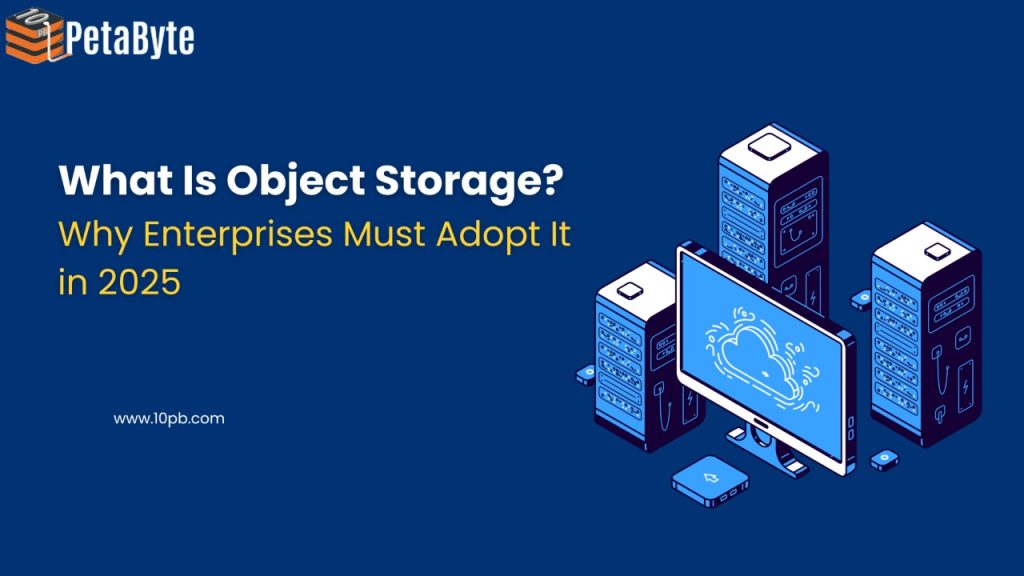Data explosion era has arrived. Data is growing exponentially, from enterprise backups to social media activity, IoT sensor logs, and HD security cameras. IDC estimates that by 2025, the total data universe will have expanded to more than 175 zettabytes, with unstructured data like emails, movies, documents, and photographs taking up a lot of space.
File-based and block-based systems, the two forms of legacy storage systems, were not designed to handle this complexity or capacity. They are not capable in the modern workload because they lag behind in terms of scalability, flexibility, and metadata management.
This is where Object Storage comes in.
What Is Object Storage?
Similar to traditional file systems, which store data as a file hierarchy, or block storage, which stores data in blocks within sectors, object storage stores data as objects. Each item consists of:
- The data itself
- Specific metadata
- A globally unique identifier
It is ideal for scalable and cost-effective storage of enormous amounts of unstructured data because of these distinct modules.
What Is Cloud Object Storage?
In simple terms, cloud object storage is object storage that is made available as a cloud service. It provides the same architecture but makes use of cloud computing capability, offering:
- Scalability on demand
- Worldwide accessibility
- Reduced overhead
- Cost-per-use pricing
Cloud object storage ensures high availability and durability while allowing businesses to store data without worrying about maintenance, capacity planning, or hardware.
Benefits of Object Storage for Enterprises
- Infinite Scalability
The design of object storage allows for horizontal scaling. The performance is the same whether you store terabytes or petabytes. Businesses that produce large amounts of unstructured data, such as CCTV footage, backups, media libraries, or logs, will find this ideal.
- Cost-effective Storage
Instead of keeping hardware on-site, pay-as-you-go pricing and tiered storage models can eliminate competition. Moving cold data to less expensive storage layers allows for cost savings without sacrificing access.
- Integrated Durability and Redundancy
Replication is often built into object storage systems, providing 99.999999999% data durability. This nifty feature safeguards your vital business data from hardware hiccups or natural calamities.
- Better Metadata Management
Plus, you can add custom metadata to any object, making it a breeze to index, search, and organize your data – a game-changer for legal e-discovery, backup restoration, and data analytics. Streamline your enterprise operations with this powerful metadata management tool!
- Anytime, anywhere access
Cloud object storage data can be accessed globally via web interfaces or APIs. Perfect for collaborative workflows, multi-region access, and distributed teams.
- Unstructured Data Optimization
For unstructured data storage, such as backups, logs, documents, videos, and photos, enterprise object storage is the best choice.
- Seamless Integration with Modern Workloads
Object storage is a perfect fit for modern, digital-focused organizations. It seamlessly integrates with cutting-edge DevOps pipelines, AI/ML workloads, media streaming, and data lakes.
Use Cases of Object Storage for Businesses
- Cloud Video Surveillance Storage
Which provides secure and scalable storage for high-definition video streams.
- Big Data Analytics
Metadata support to store and retrieve large data sets.
- Cloud Disaster Recovery & Backup
Cold storage for backup data that is both affordable and remarkably resilient.
- Machine Learning & AI
AI models intelligent enough are fueled by data lakes on object storage.
- SaaS & Application Information
Robust storage of user data, configurations, logs, and media is critical.
Why Enterprises Must Adopt Object Storage in 2025
Object storage has become a requirement for companies because data keeps growing and becoming more complex. Companies need to keep managing their data in a flexible, scalable, and cost-effective way. With object storage, they are able to:
- Scale to the exponential growth of data.
- Transition to cloud-native infrastructure
- Improve compliance and security
- Lessen infrastructure management burden
- Gain a competitive advantage through faster access to data.
NetForChoice Object Storage
We understand how crucial data is to business success.Based on Tier-4 data center facilities, our enterprise object storage solution provides:
- Flexible Cloud Storage: Data storage from TBs to several PBs
- Military-grade Data Security: Encryption for data in-transit and at-rest
- Smart Metadata Indexing: Efficient data retrieval
- Global Accessibility: Access anywhere and anytime
- Reasonable Plans: Pay-as-you-use model to suit every business
Whatever you want to transition away from legacy systems, build a data lake, or capture surveillance data, NetForChoice offers intelligent, secure, and reliable cloud object storage.
Final Thought
Companies simply can’t afford to have legacy storage systems hold them back as the digital economy accelerates in 2025. Object storage provides companies with a next-generation, future-proof solution that keeps it easy to manage, store, and expand their data.
NetForChoice Object Storage is the right partner for you when you are ready to own your unstructured data and protect your infrastructure for the future.
Frequently Asked Questions (FAQs)
- What makes object storage different from conventional storage?
Compared to typical file or block storage, object storage is scalable, metadata-intensive, cost-effective, and better suited for unstructured data
- Is cloud object storage secure for business applications?
Yes. With capabilities such as encryption, access control, and compliance built in, trusted cloud object storage vendors such as NetForChoice provide enterprise-class data protection.
- What types of information are most suited for object storage?
Basically, any unstructured data, including backups, logs, documents, photos, videos, and AI/ML data sets.
- Can object storage be utilized for backups?
Yes. For cost-effective storage of large backups, it is ideal for long-term durability and redundancy.
- Can real-time access be achieved with object storage?
Yes. Users and applications everywhere can access data in real-time due to cloud object storage and API interfaces.

